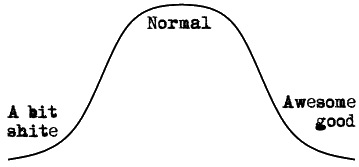My uncle Steven shared some workplace wisdom, complete with citations which I’d like to attempt to paraphrase here.
Imagine the scenario, new manager Simon has a small team, lots of work is being done. The work processes are well defined and under control so he takes a closer look at some of the outlier work.
One member of the team heavily under-performed on a particular task. Simon dutifully swings by and has some stern words. Nothing like a good telling off to keep people on track.
At the other end of the spectrum there’s another team member way doing a terrific job, far outperforming everyone else. She deserves a pat on the back so Simon pays her a visit and offers his praise and a triple chocolate belgian cookie, mmm.
Keen to know that his input has had an effect, he tracks the progress of the individuals that he gave the feedback to over the following week. With a smug grin he notices the under-performer is now solidly back in the middle of the pack, great: the feedback clearly worked! The over-performer however, she too is now delivering at a more average rate, what a shame. Clearly the criticism was more effective than the praise. Simon decides to stick to the criticism in future.
Only problem is, that’s a naive interpretation of the situation.
Had Simon not offered his feedback to the team members, they likely would have performed averagely the subsequent week anyway. The reason is that (although it may sound mean) on average: people perform averagely. Were you to plot that on a graph you’d get this, the normal distribution:

What should Simon have done instead? Armed with this knowledge a better way to approach this situation would have been instead to challenge the process. What was causing our under-performer to under-perform? Was there something stopping him from being able to do his work? Could that thing be fixed? Likewise for the over-performer: was there something to do with that batch of work that made it easier? Is there a new trick she’d discovered to help be more productive? Could we copy that and put it in the process so that everyone else can do the same?
This bell curve process based view of the world is brought to us thanks to Mr Statistical Process Control: W. Edwards Deming.
Now go, fix the process!